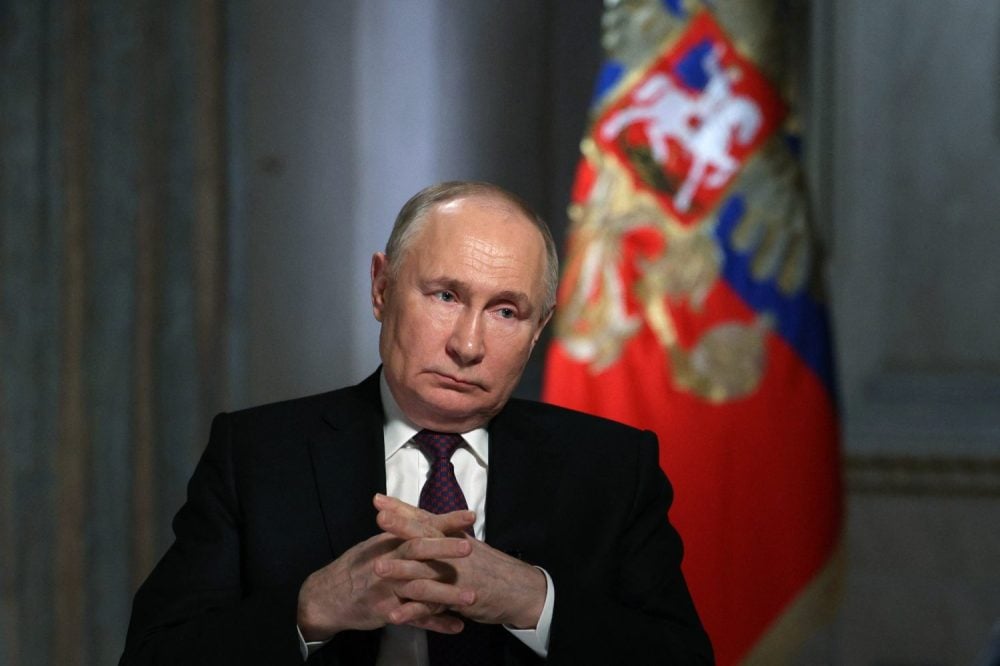On Sept. 28, Moldovan voters overwhelmingly rejected pro-Russian parties and gave President Maia Sandu’s pro-European party a decisive parliamentary majority. The victory, which came despite a massive Russia-financed influence operation to sway the election, was only the latest in a series of geopolitical setbacks for Moscow.
Contrary to Russian President Vladimir Putin’s chest-thumping bravado, he has done enormous damage to Russia’s regional and global interests since launching his full-scale invasion of Ukraine in 2022. Indeed, Putin’s policies make no sense in terms of realist theory of state behavior. They can only be explained by various assumptions regarding what motivates specific leaders to act the way they do.
The roster of Russian setbacks is long. The most dramatic, of course, has occurred in Ukraine, where Moscow could once count on a large Russia-friendly segment of the population. However, Putin’s invasion and annexation of Crimea in 2014, his instigation of violent separatist movements, and his brutal occupation policies in the Moscow-controlled regions turned public opinion in Ukraine’s Russian-speaking east and south against Russia. Today, the shift has become deeply rooted, especially given the war crimes and massive loss of life perpetrated by Russia in three and a half years of war.
When the war ends, Russia will face a heavily armed Ukraine whose population will be welded together for generations by the wounds of Russia’s aggression. A powerful Ukrainian military made up of skilled and seasoned fighters and enhanced by innovative weapons and tactics will work in concert with Europe to deter the Russian threat and limit Russian influence in Europe.
By any standard, Russia’s invasion of Ukraine has also significantly reduced Russia’s ability to project power in what is sees as its traditional sphere of influence. Not only has the war sapped Russia’s military hardware and created deep-seated problems for its economy, its military occupation and annexation of Ukrainian territory have also eroded most of Moscow’s influence among the states that emerged from the collapse of the Soviet empire.
The Commonwealth of Independent States—once Russia’s main instrument for the peaceful reintegration of the post-Soviet states—is in shambles. The Eurasian Economic Union, which Russia created a little over a decade ago as an alternative to the European Union, has been reduced to a minor trading bloc with a stable membership of only four states: Russia, Belarus, Kazakhstan, and Kyrgyzstan. Though Armenia is still a formal member, the country’s parliament officially endorsed accession to the European Union in February, prompting Russian Deputy Prime Minister Alexei Overchuk to warn of serious economic consequences for Yerevan.
Armenia’s bitter break with Russia this year has been driven both by anxiety about Moscow’s disregard for the sovereignty of its neighbors and its withdrawal of protection for Armenians in Nagorno-Karabakh. Given the acrimony, relations are unlikely to be repaired anytime soon—a remarkable development in light of Armenia’s traditional reliance on Russia.
Russia’s relations with Azerbaijan have sharply worsened as well. After a Russian police operation against Azerbaijani migrants led to several deaths, Azerbaijan rooted out Russian influence operations in the country by suspending all Russian cultural activities; raiding the offices of Russia’s propaganda arm, Sputnik News; arresting several Sputnik employees; and sharpening anti-Russian rhetoric.
Emblematic of the overall erosion of Russian influence, Armenian Prime Minister Nikol Pashinyan and Azerbaijani President Ilham Aliyev signed a U.S.-brokered peace declaration at the White House in the presence of U.S. President Donald Trump in August.
The war with Ukraine is also reducing Russia’s power projection in Central Asia, where wary former Soviet republics are increasing their engagement with China, benefiting from trade and engagement with the oil-rich Gulf states, deepening cooperation with their ethnic brethren in Turkey, and finding ways to circumvent Russia with their energy and other exports.
If this were not enough to diminish Moscow’s power in the region, the war with Ukraine has eliminated Russia as a naval factor in the Black Sea.
Farther west, Russia’s war has deepened European support for Ukraine and led to a sea change in Europe’s defense posture to meet the Russian threat. Poland, Finland, and the Baltic states have steeply increased military spending already, while most other NATO members have pledged to increase defense expenditures to at least 5 percent of GDP over the next decade. Russia’s war on Ukraine has also led to the expansion of the alliance to Sweden and Finland, the latter extending Russia’s border with the alliance by some 800 miles.
Needless to say, Russia’s war has also weakened its influence in Europe. Deep reductions in energy imports have diminished Russian economic influence, while British and EU sanctions have sapped trade and investment. Restrictions on the ability of Russians to travel and an EU-wide ban of Kremlin propaganda outlets have also limited attempts to manipulate cultural influence and engage in disinformation operations.
Almost everywhere in Europe, anti-Russian sentiments predominate among voters on the left, right, and center. The war in Ukraine, together with continual violations by Russian drones and aircraft of European airspace, has significantly eroded if not eliminated Russian soft power on the continent. Polls show that Putin and Russia are perceived negatively among virtually all European publics—including among parties of the populist right, many of whose leaders once had warm relations with Moscow.
In Italy, widespread public disapproval of Russia and Putin likely contributed to increased support for Prime Minister Giorgia Meloni and her pro-Ukrainian Brothers of Italy party and a sharp decline of support for the far-right party of Matteo Salvini, who has replaced his pro-Putin rhetoric with support for Trump’s peacemaking efforts.
In France, populist icon Marine Le Pen even criticized the U.S. decision in March to pause intelligence sharing with Ukraine. Her successor as leader of the National Rally, Jordan Bardella, has gone further, strongly criticizing the Russian invasion and going out of his way to assure NATO allies that he supports military and economic aid to Ukraine. (That said, he has also expressed misgivings about providing Ukraine with French long-range missiles capable of attacking Russia.)
Even Austria, long committed to its postwar neutrality and often suspiciously friendly to the Kremlin, has begun to cooperate closely with NATO and the EU. This has prompted former Russian President Dmitry Medvedev to issue warnings of Russian military retaliation if Vienna joins NATO. In Hungary, which remains Putin’s most reliable ally, Prime Minister Viktor Orban’s Fidesz party is running nearly 10 points behind the EU- and NATO-aligned opposition in elections slated for April 2026.
In the United States, meanwhile, Trump’s efforts to strike a peacemaking friendship with Putin do not align with his own supporters. Polls consistently show that his core electorate sees Putin as a malign force and supports arming Ukraine—as long as Europe pays for most of it. Trump’s recent reversal—his endorsement of a Ukrainian military victory and statement that Russia is only a “paper tiger”—may signify a deeper shift away from Moscow and toward Kyiv. If it is sustained, such a shift would be a game-changer. And Putin only has himself to blame.
There are exceptions, of course. The Alternative for Germany (AfD) party has gained support but still faces a long shot to take power, whereas the Merz government’s unequivocal anti-Russian stance has made up for the AfD’s Russophilia. In Georgia, a Russia-aligned party has drifted closer to Moscow’s orbit. But these small beachheads are dwarfed by the wide array of enemies Russia has made.
The rest of the world has also witnessed a diminution of Russian power. The uprising against the Assad regime in Syria created a debacle for Russia. While Moscow has held on to two in-country military bases, it has lost an important ally with the fall of former President Bashar al-Assad. The failure of Russia as a useful ally has also been exposed in Iran, where Russia sat on the sidelines and watched as Israel and the United States bombed and degraded Tehran’s nuclear program.
In Africa, the Wall Street Journal reports that the governments of Mali, Niger, and Burkina Faso are having buyer’s remorse about their relations with Russia and its mercenaries. As the Journal reports, Russia was “a rising military force in Africa” but is now “struggling to maintain its footprint on the continent” as its military, political, and financial ventures unravel.
North Korea’s support of Russia may be as unshakable as leader Kim Jong Un insists, but Russian-Chinese relations could be more malleable. Although China still resists pushing the Kremlin to settle the war in Ukraine and has emerged as Russia’s main trading partner, the logic of Beijing’s tacit support for Moscow’s war has disappeared. The United States is no longer a major contributor to Ukraine’s war effort, so China’s proxy war in Ukraine is no longer directed against its chief rival.
In short, Putin’s quagmire in Ukraine has dramatically diminished Russia as a Eurasian power. That eroded power is further threatened by the immense cost in lives, the misspent resources, and the mass emigration of programmers, technicians, and other skilled young people. All these factors undermine Russia’s future and stifle the prospect of long-term economic growth. And while Putin may have initially believed in a quick victory that would change the balance of power in Europe, three and a half years later—given Ukrainians’ courage and Western support for Kyiv—this aim is unattainable.
Why, then, does Putin persist in the folly of pursuing a deadly, deadlocked war?
Realist international relations scholars generally assume that states act rationally to advance their national interest. This perspective often works, if only as a convenient starting point for analyzing or predicting states’ behavior. Just as often, however, it doesn’t work, especially in explaining why some states act against their own geopolitical interests not just once, but consistently over time. If Putin’s actions keep contradicting the realist conception of a Russian national interest, then clearly he is not a realist. Something else must be at work in Putin’s mind.
First, there is Putin’s twisted view of history, his belief in Russia’s eternal mission to eradicate Ukraine and force its people to become Russians. As with the folly of tsarist Russia’s aim to make Russians out of Poles in the 19th century, this aim is doomed to failure amid Ukraine’s remarkable national awakening and consolidation since Putin’s first attack in 2014.
The second motive for Putin is the war’s role in consolidating Russian society around the myth of national greatness. The war also gives Putin the pretext to institute the most repressive regime since the Stalin-era Soviet Union.
Finally, Putin’s project is not about Russia’s future, nor is it about transforming Russia into a world-class economic, military, and geopolitical force. At bottom, it is about an aging despot’s desire for absolute power and a place in Russian history books as another conqueror in a long line of bloody conquerors—the long-term consequences for Russia, its people, and its future global role be damned.
Putin’s motivations for the war in Ukraine are tied to ideology, politics, and his own personality. The West should realize that Putin has no interest in—or comprehension of—peace. The only way to overcome ideology, politics, and personality is by force and deterrence. In other words, by supporting a Ukrainian victory, building European military capacity, and demonstrating to ordinary Russians and the ruling elite that Putin’s war has taken their country into a dead end.
The post From Moldova to Africa, Russia’s Power Is Waning appeared first on Foreign Policy.




